#Tessa Hadley
Explore tagged Tumblr posts
Text
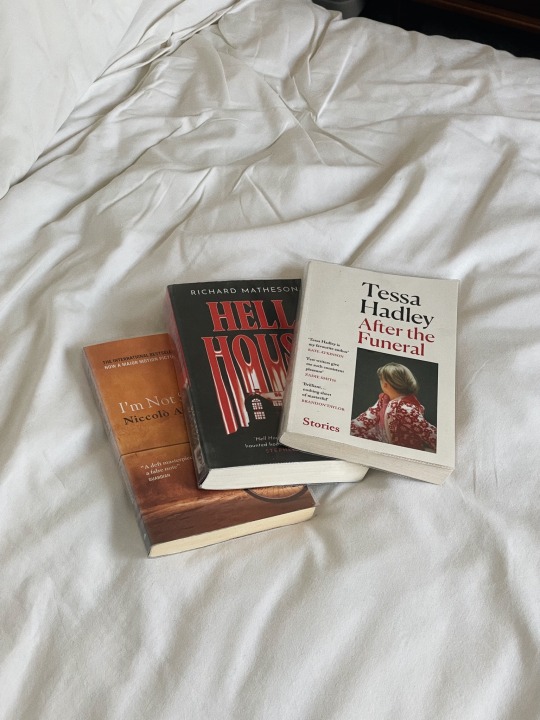
Picked up some spooky reads from the library this week 🍁🍂🎃
#studyblr#studygram#studyspo#book#books#b#bookblr#booklr#bookstagram#reading#currently reading#spooky season#autumn#tessa hadley#richard matheson#niccolò ammaniti#libraries#library#books & libraries
313 notes
·
View notes
Text
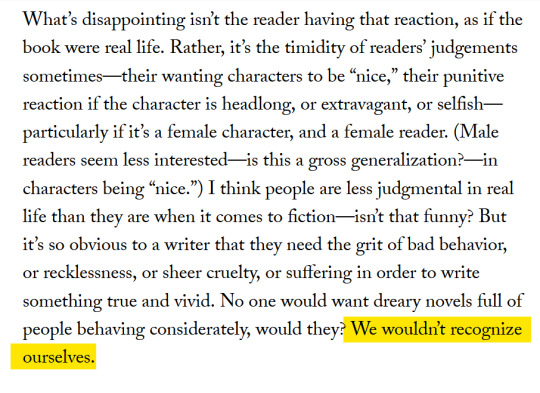
Tessa Hadley in "Would You Want to Be Friends With Humbert Humbert?: A Forum on “Likeability” (pub. 2013)" [ID'd]
#starting to think recognition is the problem. wanting to be recognized but only in a good way#q#lit#quotes#typography#essays and articles#id included#tessa hadley#on books and reading#m#x
331 notes
·
View notes
Text
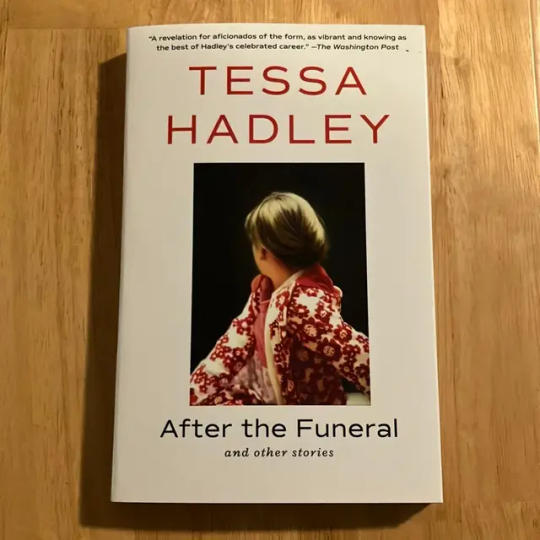
After the Funeral by Tessa Hadley
Class and character are sharply observed in this immersive collection
Tessa Hadley presents everything as fine at the front while it comes apart comprehensively at the back. The dozen short stories that comprise After the Funeral, her absorbing and thoroughly readable fourth collection, manage with a quiet dexterity the emotional situations that promote this kind of undoing.
Lynette, central character of Dido’s Lament, bumps into – or is bumped into by – Toby, her ex of many years. The collision, and what they make of it, will maintain a certain ambivalence. Who actually bumped into whom? Which of them, if either, has recovered from the damage they did one another in the past? Elsewhere it’s a different story, although as a story Old Friends occupies the same carefully curated kind of space: Christopher and Sally are made for one another – “she fitted into the shape of his own serious nature like a nut in its nutshell”. But Sally is still married to celebrity BBC war correspondent Frank, so she decides they’ll have to wait. Christopher isn’t sure what they are waiting for exactly, while the “whole exaggerated scale of Frank’s personal operation” continues to draw in everyone else “like a baggage train dragged after some showy emperor”.
That use of “personal operation” to describe a familiar kind of energetically middle-aged male narcissism sums up Hadley’s talent: the ruthless analysis of unstable situations, and of how we maintain them while we extract their resources. Her unpicking of character is focused, intense and yet always, somehow, in parallel, kind. What it does best is produce in the reader exactly what she offers her characters, for a sickening moment or two, in each story: a vast, difficult, unruly elation. For this to work, they need to arrive in front of us with comprehensive histories.
They’re often mature survivors of the 1970s or the children of those survivors: lecturers, musicians, civil servants, writers, comfortably off, less comfortably self-aware. Angie, for instance, has “escaped” a “posh county family” while Sally does “something or other part-time for the British Council”. Your overall impression – perhaps unfair – is that they have settled somewhere between Bristol and the Cotswolds in shabbily expensive old houses. The author lays off them a little but details their floor coverings and kitchen tables in gleeful closeup. They’re at ease enough with their class to enjoy the way someone holds a fork (“the poised, elegant angle of her wrist and her rather big tanned hand”). They support an affective regime in which everything from sex to nice cooking is a performance, a controllable resource that can be withdrawn instantly, “like a favour they were bored with proffering”. It’s not that the stories can’t be told without these densely worked characteristics of theirs, more that the character is the story. Often, perhaps, too obviously. Children at Chess, a study not much more than three pages long, remains unstorified by the strange little point-of-view flip in its last paragraph – although similar brisk redirections of readerly gaze are used successfully elsewhere to finesse endings that combine delicacy and horsepower.
A Hadley story will often require an outsider, or at least someone who thinks of themselves as an outsider – someone who performs that role not so much for us, the readers, but to and for the other characters. Difference is to be cherished, from the ad hoc hippy rituals of My Mother’s Wedding through the faddy diet and spectacular dissociation of Robyn, titular child of Funny Little Snake, to the cast of The Bunty Club, in which three middle-aged sisters still unconsciously await the “all transforming mystery” hinted at by their ramshackle childhood in a house by the sea. Adults who don’t fully remember an odd upbringing are still trying to find somewhere to fit in while their hearts seem to understand that childhood long ago shaped their adult circumstances. You could find this conclusion banal, but the author’s deft switches from comedy to drama won’t permit it. Sometimes a kind of gothic is required to turn the trick: there are pungent, luxurious descriptions of magic gardens, magic houses, magic families, and especially of magic interiors in which something’s not quite right – though never visibly wrong. Rain “comes sluicing” across big windows, wheelie bins blow over, rooms are either “greenish and spectral or bleak with the lights on in the middle of the day”. The disaster is sensed, if never quite consummated.
And anyway, down the road somewhere another story is always already fermenting. In Men, two women called Jan and Michelle find themselves in a hotel bar. They are sisters, but in the Hadley way: that is, they haven’t set eyes on one another for 15 years. We want to know why. Beautiful Jan is “tall and serene, and pale”. Michelle works in the hotel office, never was beautiful, has “a little pasty face as soft as putty”. She’s instantly aware of her sister’s presence, “like an animal picking up a scent, a smear of something rank”. The men, meanwhile, unaware of this suddenly resumed, weirdly tense relationship, are loud and middle-aged; stand easily at the bar, relaxing into their money.
What’s revealed before the story ends might change something, even for them, smug as they are. More likely, it will make a small but significant adjustment in the reader’s view of the world. In a 2007 review of Hadley’s first collection, Anne Enright described her as “immensely subversive” – a judgment that has only gathered force since. Whatever Hadley’s characters believe about themselves, they’re always working hard for change, striving, consciously or otherwise, to knock the props out from under whatever life they’re leading.
Daily inspiration. Discover more photos at Just for Books…?
7 notes
·
View notes
Text
Winding Up the Week #402
An end of week recap “There are only two or three human stories, and they go on repeating themselves as fiercely as if they had never happened before.” – Willa Cather (born 7th December 1873) Following a literary lull of sorts after ‘nonstop November’, it seems increasingly likely January 2025 will be a relatively busy month for those who like to participate in several reading events at once – in…
#EchoesofEcoII#EdnaObrien2025#2025 American Masterpieces Chapter-a-Day Read-Along#A Year With Edna O’Brien#Alex Haley#C.E. McGill#Cathy Converse#Christmas Books#Donal Ryan#Echoes of Eco II#Edna O’Brien#Herman Melville#Larry McMurtry#Melissa Harrison#Pierre Lemaitre#Tessa Hadley#Umberto Eco#Willa Cather#Winter Reading
0 notes
Text
Tessa Hadley, escritora: "La escritura es un acto contra el olvido"
La autora británica, admirada por Zadie Smith o Chimamanda Ngozi Adichie, charla con el suplemento ‘ABRIL’ una semana antes de visitar España para presentar ‘El pasado’, novela que acaba de llegar a las librerías españolas Origen: LIBROS | Tessa Hadley, escritora: “La escritura es un acto contra el olvido”

View On WordPress
1 note
·
View note
Text
"Vincent's Party" by Tessa Hadley
0 notes
Text
Evelyn veered between two extremes; either she spent hours dressing herself up extravagantly, or she slopped around at home in her oldest skirt and cardigan and slippers. Her scruffy self was her reading self. To give herself properly to a book she had to be crumpled and snug, oblivious of her appearance, scrunched up in an armchair with her shoes off and her legs tucked under her. When she was really reading, she forgot who she was. Yet when she went out to lectures or classes—she was in her first year at the university, studying French—she worked anxiously in front of the mirror to make herself look more like a student and an intellectual: beret tilted to one side, silk scarf fastened insouciantly around her throat. “Insouciant,” she murmured with a French accent, gazing adoringly at herself, finishing off her outfit with a couple of books under her arm.
From Tessa Hadley's New Yorker short story "Vincent's Party."
0 notes
Text
Tessa Hadley on Marriage’s Metamorphoses | The New Yorker
"I compared the experience of being married for decades to that folktale in which you have to hang on to your lover while he or she undergoes a series of metamorphoses, including some monstrous ones. I remember being told when I was a child that we change our skins seven times in a lifetime—I’m not sure how scientific that is, but long marriages are a bit like that. Incrementally, perhaps almost imperceptibly to those involved, each partner goes through a succession of transformations—in appearance, in degree of contentment, in character, and in his or her role in the outside world, as well as within the power balance of the relationship. I love the way that fiction can make drama out of this, telescoping those processes which may feel, as we live through them, almost geologically slow. Fiction can speed them up and display them boldly and starkly against the background of passing time. It’s like rendering fate itself inside the story frame"
0 notes
Text
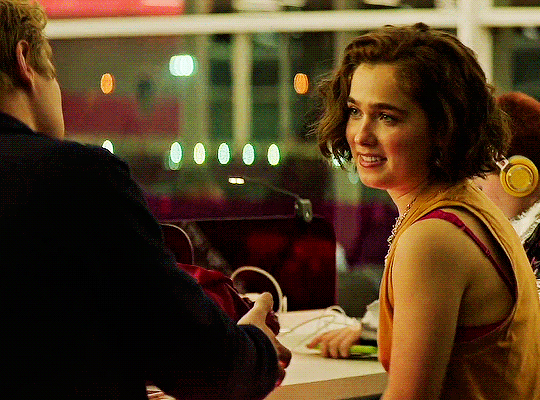
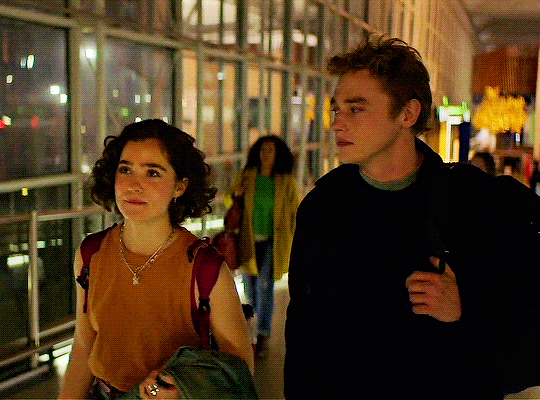
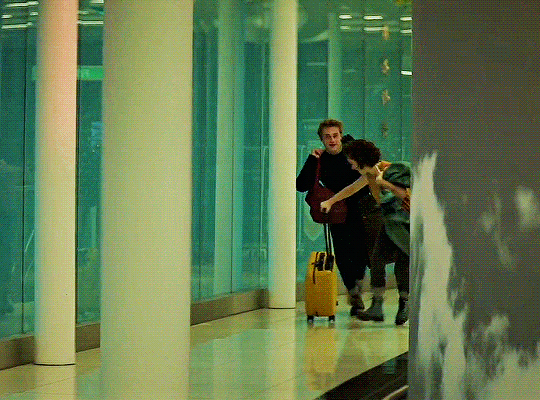
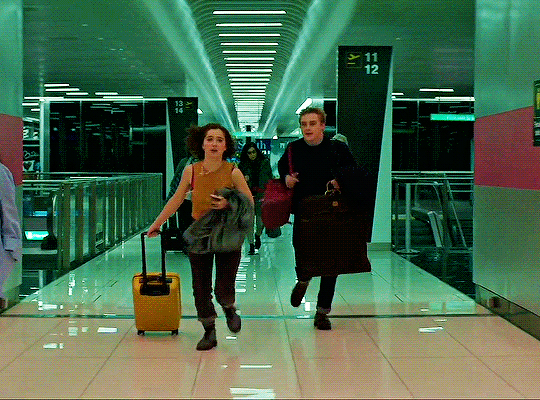




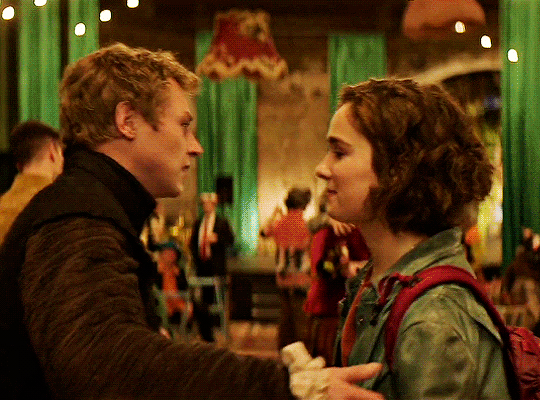


Hadley Sullivan and Oliver Jones will kiss 12,872 times in their life together. They'll be married 58 years, have 1,462 arguments, and make love 5,787 times. Hadley will hold Oliver's hand when Tessa takes her last breath. Oliver will hold Hadley's when she takes hers. And they will both hold their daughter's hand the day she's born and marvel at her tiny fingers and how none of it would have been possible were it not for a missed flight, a broken seat belt, and a choice to love each other every day.
#cute things#love#movie#movies#filmedit#filmedits#love at first sight#rom com#romantic comedy#gif#gifs#gifset#haley lu richardson#Hadley Sullivan#Ben Hardy#Oliver Jones
2K notes
·
View notes
Text
Vane's List Of Names

I mentioned before that I'm a writer, and I keep a list of names that I consult when I need a new DR name. As promised, I'm posting the list here in case anyone needs some help with their own script.
Note: I DO have more fem names than masc names (sorry) but there's also a bunch of gender neutral names I love. <3

Gender Neutral
Alex
Atlas
Azusa
Bailey
Blake
Cameron
Casey
Charlie
Dakota
Dylan
Emerie / Emery
Envy
Fallon
Georgie
Harper
Hayden
Holland
Hunter
Idris
Jasper
Jem
Jessie / Jesse
Jordan
Logan
Maeve
Martin
Morgan
Noah
Reize
Remi
Robin
Rory
Rowan
Rune
Sam
Sasha
Sky
Sloane
Sol
Spencer
Tatum
Taylor
Tyler
Valentine
Kai
Raegan
Wren
Zia
Fem-Coded
Adelaide
Aja
Ajatri
Alayna
Aleida
Alice
Alina
Allison
Amara
Amaya
Amre
Anastasia
Andromeda
Anessa
Angela
Annabel
Annabeth
Annalys
Anne-Marie
Annika
Anya
Aria
Arya
Astrid
Atalia
Athena
Aurora
Ayla
Azara
Bianca
Bridget
Camicazi
Carly
Cassandra
Charlotte
Chloe
Cielle
Clara
Clarette
Clarissa
Claudia
Cora
Cordelia
Danica
Darcy
Della
Diana
Echo
Elara
Enid
Erica
Esmarie
Estelle
Eunomia
Evelia
Evie
Evora
Gemma
Genevieve
Grace
Hadley
Haelyn
Hayley
Hope
Ija
Inanna
Inara
Indigo
Indira
Iris
Isabelle
Iskra
Isleen
Isobel
Jade
Jasmine
Jenna
Jessica
Julia
Juliette
Kailyn
Kala
Kalani
Kali
Kallian
Kalista
Kamala
Kasia
Kassidy
Kate
Katie
Kaya
Kayla
Keira
Keja
Kelsie
Kendra
Khiti
Kinsey
Kinsley
Kourtney
Kristen
Kylie
Lani
Lena
Lexi
Lia
Liana
Lila
Lilliana
Lilith
Lily
Lizzie
Luna
Lunaris
Lyanna
Lydia
Lyla
Lyra
Maddie
Madeline
Madisyn (Madi / Mads)
Maira
Mallory (Mal)
Malia
Malina
Marcelene
Marella
Maretta
Maria
Marianna
Marisol
Mavis
Melody
Mercedes (Sadie)
Meridia
Michaela
Millane
Moretta
Myrcella
Myrcelle
Naima
Nara
Natalia
Natasha
Neera
Nefeli
Nerissa (Nessa)
Nymeria
Nyx
Pandora
Pearl
Pepper
Piper
Rachel
Ravenna
Rayne
Rayyana
Rosa
Ruelle
Sadie
Saige
Samantha (Sam)
Samirah (Sam)
Savannah (Sav)
Scarlett
Sereia
Shivani
Sienna
Sirine
Solana
Sophia
Sophie
Soraya
Summer
Sylvia
Sylvie
Talia
Talto
Tara
Taria
Teagan
Tessa
Tessabelle
Thalia
Thena
Theresa
Tiyenna
Valeria
Vane
Victoria
Vienna
Visha
Wanda
Zhara
Zoe
Zoey
Masc-Coded
Alaric
Asael
Asher
Cahir
Caspian
Conan
Eros
Ethan
Evan
Jeremy
Julian
Kane
Luke / Lucian
Marcel
Oliver
Raphael
Ronan
Warner
William / Will
Surnames
Anderson
Aspen
Baker
Barnes
Bishop
Daxer
Foster
Graves
Grayson
Harper
Holland
James
Jayde
Keita
Keller
King
Lawrence
Lawson
Linden
Madden
Marshall
Miller
Moore
Morris
Pearson
Pierce
Prince
Reeves
Thorne
Smith
Solace
Summers
Wilson

Bonus! Valyrian Names
(first names only)
Aerion (M)
Araenia (F)
Chaereah (F)
Daenera (F)
Daenya (F)
Daenys (F)
Delaena (F)
Daenerya (F)
Daenyra (F)
Elaena (F)
Haella (F)
Maela (F)
Maerys (F)
Naelyra (F)
Nerys / Naerys (F)
Raenela (F)
Rhaegon (M)
Saelyra (F)
Saerya (F)
Selaehrys (F)
Selaena (F)
Shiera (F)
Tyrax (M)
Valaena (F)
Veraena / Vera (F)
Vyra (F)
Vysea (F)

Notes:
Feel free to use this list for your DRs, and good luck.
I would absolutely LOVE to know if this helped anyone! <3
And I'll be posting the link to it on the original post I made about this list as well as my pinned introduction post.
Inspired by @batsyi
Happy Shifting!
XO

#vane shifts#vane writes#shifting script#desired reality#shifting blog#shifting motivation#reality shifting#shifting realities#shifters#shifting#shifting community#shiftblr#anti shifters dni
32 notes
·
View notes
Text
after the funeral.
dialogue prompts from after the funeral and other stories by tessa hadley.
i've never been to a funeral before.
you're like a tragic actress in a film.
i don't want the future, i want ____ back.
i don't know what i'm doing here in your crazy world.
it's so good to get away from it all.
there's nothing wrong with having a bit of fun.
what would happen if i weren't here to keep a eye on everything?
we were like a real family.
i don't want to rush into anything i'll regret later.
go away and leave me here. i want to die.
you will get over it, i promise. whatever it is.
everybody makes mistakes. you just have to be strong enough to learn how to live with them.
this is a stupid place to be at any time, let alone _____.
i'm just as stupid as everyone else.
you look prosperous.
do i sound smug?
i'm not really the marrying kind. or the mothering kind, either.
here's my number. text me so i get yours.
i wish i had my time over again.
i never regret anything.
i know i ought to act, but i don't have any conviction.
i adored you. i envied you.
i like parties where everyone has a history with everyone else.
i was pretty much angry about everything at that age.
you're such an old stick in the mud.
i don't care if i die.
nothing is sacred with you.
every child ought to want something. it's only healthy.
funny little snake, aren't you?
i don't know why i came back.
i knew you'd come back.
please don't say goodbye.
take your chance and get out of here.
my father was a fine waste of space.
is it really that easy to forget everything?
who are you, when you're at home?
a man's got to know how to finish what he started.
you learn a lot about people from the way they leave a hotel room.
this has always been my favorite place.
i would like you to stay. i would.
i can't leave the house.
it was probably only a dream.
don't worry. it happened to me in another life.
you're supposed to be such a feminist.
i've always wanted to tell everyone everything.
that isn't exactly the childhood i remember.
it doesn't look good, does it?
that's why i'm so useless. we always had servants to do everything.
i only ever eat five things.
is this what you do for a living? is it well-paid?
i just need to be alone for a few minutes.
all i have is personality.
i'm never in the right place at the right time.
i loved you best of all.
i've had my share of happiness.
but i hate the safe side. the safe side's so boring.
i'll be alright in just a moment.
19 notes
·
View notes
Text

The Party by Tessa Hadley
The author’s novella about two young women whose yearning for freedom comes at a price sometimes feels unconvincing and underpowered
While Tessa Hadley’s The Party began its life as a New Yorker short story, it seems that it wouldn’t, for her, go away. At some point she found herself moved to continue the narrative, and so it became the first of the three chapters of what is now a novella. In my mind, these chapters resemble the mirrors you might find sitting on top of an old-fashioned dressing table, each one providing a different angle, sometimes lovely and sometimes unexpectedly ugly, for the person (the reader) who happens to be gazing into them. The book begins with a party, after all: noses must be powdered, and lips carefully blotted. Only later does anyone notice that the hair on the back of a head has unaccountably become matted, that smudged mascara has darkened pale cheeks.
The dishevelment in this story comes courtesy of two men: the sinisterly named Sinden and his friend Paul. At a party in an old boozer in the Bristol docks some time after the war (the Malayan emergency is under way, so we’re talking 1948 or later), these two are loitering rather hungrily when Evelyn, who’s reading French at university, arrives to meet her older and more sophisticated sister, Moira, a fashion student. As the night wears on, neither girl is taken with either of these blokes particularly, but a certain boredom and competitiveness induces them first to drink with them and then to run away from them. Better to get the bus home, they think, than to accept Sinden’s self-proclaimed attempt at “abduction”, however jocular.
But as Moira wisely notes, it’s impossible to get away from “that kind of man”. She and Evelyn survive the party, with its warm gin and undrinkable cider, but Sinden and Paul are playing a longer game, one made all the more easy to win by the sisters’ circumstances. Oh, but the stultification of home! Their parents’ marriage is fractious and fraying. Their science-mad little brother, Ned, is a pest. Both are full of longing: Evelyn for a man she has yet to meet, and Moira for one who’s otherwise entangled. No wonder, then, that when the phone rings at supper time one Wednesday evening, they’re apt to accept the invitation it heralds.
And who, in any case, is going to forbid them this? The finer delineations of class streak this book like the rivulets of water that run down the steamed-up windows when their mother cooks Sunday lunch. The sisters’ putative “friends” Sinden and Paul live in smart Sneyd Park, where they’ve been asked to play mahjong. How nice! Though their father heard a male voice when he picked up the receiver, the man on the other end of the line sounded self-assured. “Don’t spoil your sister’s evening,” he admonishes Evelyn, when she briefly hesitates, suddenly feeling that she’d rather stay at home with Andromache.
In the end, then, Evelyn and Moira do find themselves in a far-off big house, enfolded awkwardly by its posh, rather affected young inhabitants (one of them is called Podge), and over the course of a night, innocence is exchanged for (anti-climactic) experience. What happens, about which I shouldn’t say more here, is moderately shocking in context – though not, perhaps, for the reasons Hadley imagines. I argue somewhat with her notion of the risks middle class young women at the back end of the 1940s might be willing to take in the pursuit of freedom. However, the greater problem by far when it comes to the story’s denouement is her decision to tie up the tale neatly with a bow. Why spell out so explicitly that this night changes Evelyn and Moira? Such emphasis undercuts all that has happened, as if Hadley is suddenly anxious her story has too little weight.
But perhaps she’s right to be worried. I’ve always loved Hadley’s books, her earlier novels (The London Train, Clever Girl) particularly; at her best, she has something of Elizabeth Taylor about her (there is no higher praise). More recently, though, something new has crept into her writing: a self-consciousness that has her overstuffing her sentences with adjectives (“the small, slack breasts with their dark spreading nipples were derisory, insulting”) even as she’s happy to deploy cliches (here, she writes of bombed-out Bristol’s “broken-toothed skyline”).
It has, I think, to do with her move backwards in time: she’s so much less comfortable as a writer in the past than in the near-present, and in this book, as in her previous novel, Free Love, the historical details are often unconvincing, too generic truly to be felt. If the story’s more shocking events strain for effect, so do the quotidian details: the laboured descriptions of clothes, music and (especially) food. The novella’s scantness should deceive; it is a form whose punch should feel disproportionate, even a little dangerous (think of Mary Gaitskill or Claire Keegan). But this one is too slight, and too underpowered: a strangely watered-down thing, not heady enough even to leave you with the whisper of a hangover.
Daily inspiration. Discover more photos at Just for Books…?
6 notes
·
View notes
Text
Love At First Sight (2023)
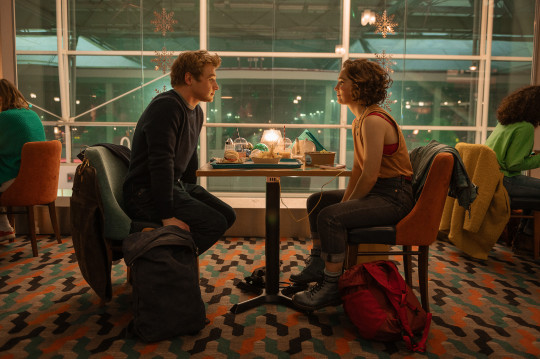
Okay, we’re going to talk about the new Netflix romance directed by Vanessa Caswill, Love At First Sight, because I’m seeing almost no chatter about it and that cannot stand. Full disclosure, I’ve never read the book on which this movie is based, The Statistical Probability of Love at First Sight, so I’m reacting only to the film (which I’ve now seen 4.5 times in 2 days).
The Surface Reading
It’s a perfect, tight, adorable little RomCom that’s heavy on the Rom and light on the Com, with a wrenching dash of angst and the most hair-twirling chemistry between two leads that has graced our screens in years. Truly, if all you want is 90 minutes of two actors being saccharine precious cinnamon rolls, look no further!

There are simple takeaways here, like that chance can only take you so far, but in the end you have to choose to love. Or that change and loss are part of life and you can’t run from them. Or that London is a massive labyrinth of eccentric people that probably looks 400% cooler onscreen than it is in reality (I wouldn’t know, I’ve never visited, so this and the 90s Parent Trap are the extent of my knowledge about the city, sorry).

Anyway, I adored how straightforward the story was - that the narrator (played brilliantly by Jameela Jamil) tells you directly in the first two minutes that it’s a story about love, fate, and statistics. She then repeatedly describes every development as it is happening, the characters’ histories and internal monologues, and all the context you need to follow the thin but fast-paced plot. The writing, performances, and production design are all solid, allowing the audience to get lost in the romance as it unfolds.
BUT if you’re slightly unhinged like I am and you’re always looking for more layers in your media, HAVE NO FEAR! There is in fact more going on in this little movie than you might expect.

Color Theory
For starters, the use of red and green in the film is fascinating. Yes, I realize the action of the story takes place a few days before Christmas, so you might assume it was just a seasonal aesthetic choice, but if you look closer, you can see very carefully selected shades of red and green repeating throughout the film. The red is a cool, deep rose color, sometimes pink, while the green is cool and dark, like oxidized bronze rather than emerald. Further, while they appear over and over, these hues are rarely used in a purely decorative or festive way. Instead, they play a role in the separation and coming together of the couple. On a color wheel, red and green are complements, perfect opposites that are never adjacent but always joined in the middle.
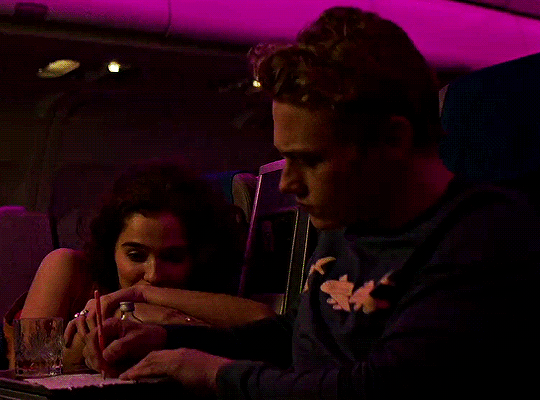
The title card during Hadley’s introduction is literally a green stripe over a red stripe, then the hallways of the airport are green, and of course Hadley’s ever-important backpack is a rosy red. As the couple grow closer on their flight, the light turns pink. Once in London, a green van takes Oliver one way while a red taxi takes Hadley the other. At her father’s wedding, Hadley is dressed in red (“the color of a bruise” she calls it), contrasting beautifully against her green jacket. Upon realizing Oliver’s true purpose, she chases after him on an iconic red double-decker bus. Meanwhile at the living memorial, Oliver’s father is dressed in red while his mother wears a faded green, as if to say she is already beginning to fade away. The event is decorated with green drapery and streamers, and there are even stacks of red and green chairs in the stairwell where Oliver begs his mother to receive treatment.
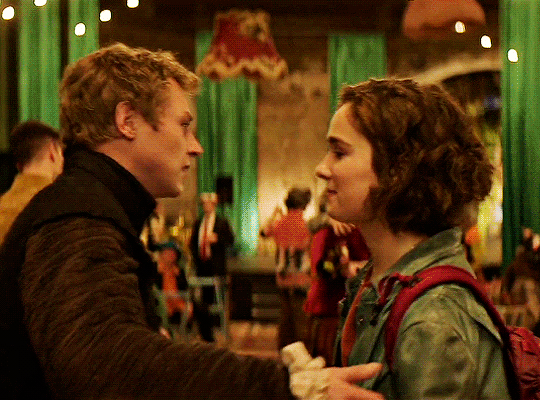
Hadley gifts her red and green bouquet to Tessa, and when she is driven away, a green-clad narrator returns the red backpack to Oliver. Wandering London alone, Hadley exchanges her painful red heels for a pair of green trainers (“sneakers!” she insists), and tries to call her dad first in a red phone booth and then on a phone from a stranger sitting in a cluster of red chairs. Finally, Oliver chooses to pursue Hadley to the wedding reception which is lit in pink, and where they finally share the long-awaited kiss.

There are many more examples, but in general we see that green indicates separation and loss, while red symbolizes joining, intimacy, and (what else?) love! It lends the film a gorgeous, subtle aesthetic without being garishly festive, and shows the lovers’ emotional journey from lonely childhood to vulnerable, loving adulthood.
Death and Rebirth
Speaking of which, there’s plenty of rebirth imagery too! When Hadley and Oliver meet, they are both still children, struggling with the impending loss of parental security through divorce and death. Thus, when they board the plane, it is as if they enter an underworld or womb, separated from their families and remade as new adults. They emerge on the other side into a hallway (read: birth canal), as each must still confront their own dying childhood before they can join as full and equal partners. Hadley journeys to a bright, red-strewn celebration of life, while Oliver must enter a dark green commemoration of death, his fear driving him deeper to hide in another hallway. Here his mother comes to find him, begging him to emerge into life, but Ollie still can’t confront her death alone.

Thankfully, Hadley travels to this underworld to find him, bursting into the memorial like a bright red flower. Even the bruise metaphor works, acknowledging the pain they are both experiencing at the changes in their lives. But Oliver still refuses to face his fears, trying to take a shortcut around death to life with Hadley. Still, she knows he’s not ready (likely because she’s not yet, either), and gently pushes back. And so, Oliver returns to the underworld, and Hadley walks off alone until she descends barefoot through a soggy riverside tunnel (birth canal again!). Finally, she calls her father and admits she is “lost.” When he arrives, Hadley at last gathers the courage to ask why he ended their old life, and to tell him how much it hurt her. But as Oliver predicted, she forgives her dad and even begins to accept his new bride.
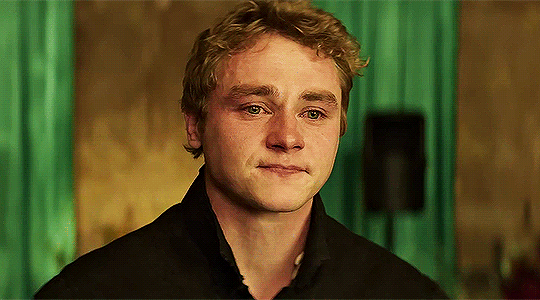
Back at the memorial, Oliver is reminded by Hadley’s red backpack - his unaddressed emotional baggage - to be honest about his pain. In at last openly mourning his mother and his own childhood, Ollie takes a step into adulthood, just enough for his family to nudge him that extra bit to go after Hadley. And so, the family delivers him to his bride, who has meanwhile learned to dance again, even through her heartbreak. With one last confession, the two consummate their love with a kiss, bathed in pink light before an open door.
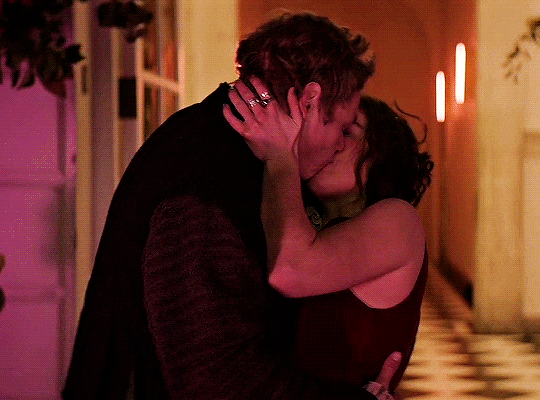
Happily Ever After
There’s so much more, with the hand-holding, numbers, Shakespeare, Dickens, the music, and beyond, but the point is that this cute, charming little romance is actually very deliberately constructed. It follows timeless patterns and motifs which we instinctively understand through visual and auditory language. And the narration plays a huge role in this as well, not unlike the prologues and epilogues of the Bard’s plays in that they state the story’s lessons plainly: that we cannot always be prepared for unwelcome surprises, but that we can make the choice to love every day.
Anyway, Vanessa Caswill deserves all the flowers and if you haven’t seen her gorgeous adaptation of Little Women (with all due respect to the marvelous Greta Gerwig and Gillian Armstrong), please do yourself a favor and watch that after you finish this!
#love at first sight#romantic movies#the statistical probability of love at first sight#netflix movie#vanessa caswill#hadley sullivan#oliver jones#haley lu richardson#ben hardy#jameela jamil#katie lovejoy#jennifer e smith#romantic comedy#romcom#coming of age#rebirth#underworld#color theory#meta#my meta#search for the lost husband#underworld journey#little women 2017#shakespeare#charles dickens#romance#holiday movies
271 notes
·
View notes
Text
"El pasado", de Tessa Hadley
La novela extranjera recomendada este miércoles por Zenda es ‘El pasado’, de Tessa Hadley, publicada por Sexto Piso. Origen: Zenda recomienda: El pasado, de Tessa Hadley – Zenda

View On WordPress
0 notes
Text
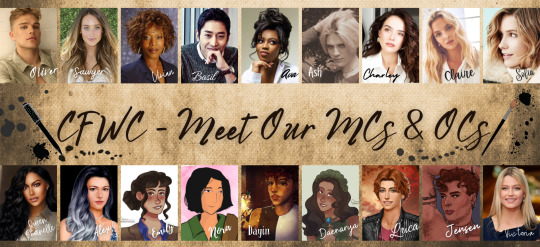
Meet Our MCs and OCs: P - Z
@peonierose
Open Heart F!OC: Luna Auclair (Featured: July 2024)
@petiteboheme
The Royal Romance: F!MC: Ava Flores (Featured: September 2023)
@phoenixrising308
The Royal Romance/The Nanny Affair MC: Ariel Russo
Various Series MC: Jessica Garcia
Various Series OCs: The Garcia Family
@potionsprefect
Open Heart F!MC: Victoria Clarke (Featured: October 2023)
@princess-geek
Desire & Decorum F!MC: Beatrice Foredale
@pulpitude
Bloodbound F!MC: Raida Pearce
It Lives Within NB!MC: Amethyst Grimes 🏳🌈
@queenmiarys
The Royal Romance MC: Juliana Rodriguez
The Royal Romance MC: (LI: Liam Rys) Amelia Ramos
@rosepetals1
Perfect Match F!MC: Arielle Park
@rosesnink (formerly noesapphic)
Blades of Light & Shadow F!MC: Brienne Erinae Nagoni 🏳️🌈
Crimes of Passion F!MC: Neera Elena Rose 🏳️🌈
Desire & Decorum F!OC: Countess Celestine 🏳️🌈
Desire & Decorum F!OC: Joanna Mills 🏳️🌈
Desire & Decorum F!OC: Hayley Parker 🏳️🌈
Desire & Decorum F!OC: Marianna Sinclaire
Guinevere F!MC: Guinevere 🏳️🌈
Kindred: Amaryllis Lilac Woodstock 🏳️🌈
The Royal Masquerade F!OC: Olive Aster Rys 🏳️🌈
The Royal Romance F!MC: Eclipsa Sonia Ice 🏳️🌈
The Royal Romance F!MC: Louise Rys
The Unexpected Heiress F!MC: Claire Hayes 🏳️🌈
@starrystarrytrouble
Open Heart F!MC: Eve Valentine
@storyofmychoices
Blades of Light and Shadow: Daenarya of Riverbend 🏳️🌈 (Featured: May 2023)
Blades of Light and Shadow: Iliana Maria Volari
Crimes of Passion F!MC: Lilah Rose
Mother of the Year F!MC: Laura Day 🏳️🌈
Open Heart F!MC: Ellie Shepherd
Open Heart F!OC: Olivia Hadley (Featured: April 2024)
Open Heart M!OC: Makoa Lahela (Bryce x Olivia Son)
Open Heart F!OC: Malia Lahela (Bryce x Olivia Daughter)
Red Carpet Diaries F!OC: Alex Hunt (Featured: September 2023)
The Unexpected Heiress MC: Christie Hayes
@squid-princess-teach-swallow
The Royal Romance: Kate Brooks
@tessa-liam
The Royal Romance F!MC:��Riley Brooks-Rys (Featured: September 2023)
The Royal Romance F!OC: Riley Brooks
The Royal Romance F!OC: Sophia Taylor
@theinvisibledreamergirl
Open Heart F!MC: Klaudia Craig
@trappedinfanfiction
Crimes of Passion F!MC: Sofia D’Angelo Rose
Open Heart F!MC: Celia Moore (Featured: September 2023)
Open Heart F!OC: Zoe Pierce
Wake the Dead F!MC: Avery Wright
@tveitertotwrites
America’s Most Eligible: Charlie Howard
Open Heart F!OC: Adelaide Barnes
Open Heart F!MC: Claire Evans
Red Carpet Diaries: Brooklyn Moore
The Royal Romance: Briar Boleyn
@vampirkit
Bloodbound: Lucy West 🏳️🌈
@zealouscanonindeer
Open Heart F!MC: Aspen Kallie
Open Heart F!OCs: Jade and Tatum Ramsey
Open Heart F!OCs: Ramsey Children
Return to Main Masterlist
12 notes
·
View notes
